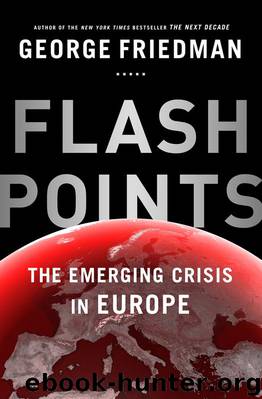Flashpoints by George Friedman

Author:George Friedman
Language: eng
Format: mobi, epub
ISBN: 9780385536349
Publisher: Knopf Doubleday Publishing Group
Published: 2015-01-26T18:30:00+00:00
Part Three
FLASHPOINTS
8
The Wars of Maastricht
The drafting, signing, and implementation of the Maastricht Treaty was intended to usher in a time of peace in Europe. It is ironic, therefore, that the creation of the European Union coincided with the start of major European wars in both the Balkans and Caucasus. In the Balkans, there were about a quarter of a million casualties in the 1990s. In the Caucasus the Armenia–Azerbaijani war cost about 115,000 casualties, and hundreds of thousands were displaced. Maastricht did not cause these wars, and the warring parties were not part of the European Union. Nevertheless, it is a fact that the time when the EU was created was also a time of war. In fact, since the EU was created, there have been more wars in Europe than between 1945 and 1992.
Many Europeans evade this fact. They regard Yugoslavia as unique and not reflective of modern Europe, and the Caucasus wars as not really European. History had left Europe with a hunger for pride, a wish to demonstrate that there was something extraordinary about Europe other than imperialism or mass murder. A belief had developed that the Europeans had learned the lesson that war doesn’t pay and had devised a society that had put war behind it. They thought they had something important to teach the world. As prosperity returned to Europe, the persistence of peace became a key part of the story of their resurrection. It was important for the Europeans to deny that these wars were European. Yet they were, and they spoke to the fragility of peace.
Another kind of evasion is possible as well. When NATO attacked Serbia in the war over Kosovo, the United States did the heavy lifting in the war, accompanied by some NATO allies. Very quickly, the war turned, psychologically, into an American war from the viewpoint of many Europeans. Denial can take the form of insisting on collective security, yet regarding the actual acts of war as belonging to someone else, in this case the United States.
The Balkans and the Caucasus are borderlands, and within these borderlands more borderlands are nested like Russian matrushka dolls, one inside the other. Each is smaller than the last, and they continually surprise you when one more borderland, ever smaller, appears. Finally you are left with tiny villages divided into factions of families or parts of families, each hardened by history and conflict, never forgetting, rarely forgiving.
It is not surprising that the two wars took place in mountainous regions. Small nations survive in mountains despite wars and conquest. The mountains shield them and provide refuge. But mountains also make it difficult to create nations. The mountains fragment as well as shield, and in the mountains families and clans can be more real than nations. Mountains frequently hide what might be called proto-nations, premodern entities linking clans with common languages and religions with each other.
Mountains are often lawless places. If conquerors can’t root out the small, fragmentary nations, then they can hardly be expected to enforce laws.
Download
This site does not store any files on its server. We only index and link to content provided by other sites. Please contact the content providers to delete copyright contents if any and email us, we'll remove relevant links or contents immediately.
| Arms Control | Diplomacy |
| Security | Trades & Tariffs |
| Treaties | African |
| Asian | Australian & Oceanian |
| Canadian | Caribbean & Latin American |
| European | Middle Eastern |
| Russian & Former Soviet Union |
The Secret History by Donna Tartt(18054)
The Social Justice Warrior Handbook by Lisa De Pasquale(11930)
Thirteen Reasons Why by Jay Asher(8398)
This Is How You Lose Her by Junot Diaz(6401)
Weapons of Math Destruction by Cathy O'Neil(5779)
Zero to One by Peter Thiel(5444)
Beartown by Fredrik Backman(5293)
The Myth of the Strong Leader by Archie Brown(5204)
The Fire Next Time by James Baldwin(4986)
How Democracies Die by Steven Levitsky & Daniel Ziblatt(4932)
Promise Me, Dad by Joe Biden(4890)
Stone's Rules by Roger Stone(4818)
100 Deadly Skills by Clint Emerson(4647)
Rise and Kill First by Ronen Bergman(4527)
A Higher Loyalty: Truth, Lies, and Leadership by James Comey(4520)
The David Icke Guide to the Global Conspiracy (and how to end it) by David Icke(4348)
Secrecy World by Jake Bernstein(4342)
The Farm by Tom Rob Smith(4294)
The Doomsday Machine by Daniel Ellsberg(4220)
